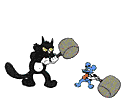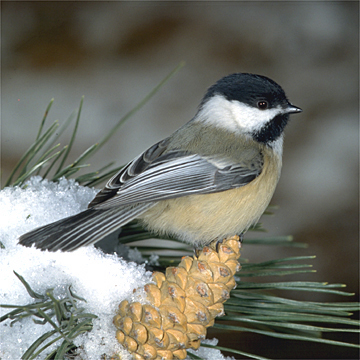Redwings singing on teritory, East Vancouver
- bradhurley
- Posts: 2330
- Joined: Wed Oct 09, 2002 6:00 pm
- Please enter the next number in sequence: 1
- Location: Montreal
- Contact:
Your blackbirds are in essence a black version of our robins; they are in the same genus and are very closely related. They look and behave remarkably similar although their songs are different. Our robins have long been considered a sign of spring, but they are "partial migrants," meaning that some individuals stay behind all winter and others migrate. Even here in Montreal I often see robins in a normal cold winter. In Vermont I would see bluebirds and robins all winter long in the apple orchards. So the redwing is a more reliable harbinger of spring.
I was in Brittany over the holidays and was surprised to hear so many birds singing in the mornings (including European robins and blackbirds). Here we don't usually hear birdsong until mid-January, when the chickadees and cardinals start singing as the days start getting noticeably longer. A few weeks after that the mourning doves start in, along with the house finches. There's a tiny gland in a bird's brain called the hypothalmus (I believe we have it too) that registers the length of daylight; once the day reaches a critical length (different for each species), it triggers the production of testosterone and the males start singing.
I was in Brittany over the holidays and was surprised to hear so many birds singing in the mornings (including European robins and blackbirds). Here we don't usually hear birdsong until mid-January, when the chickadees and cardinals start singing as the days start getting noticeably longer. A few weeks after that the mourning doves start in, along with the house finches. There's a tiny gland in a bird's brain called the hypothalmus (I believe we have it too) that registers the length of daylight; once the day reaches a critical length (different for each species), it triggers the production of testosterone and the males start singing.
- s1m0n
- Posts: 10069
- Joined: Wed Oct 06, 2004 12:17 am
- antispam: No
- Please enter the next number in sequence: 10
- Location: The Inside Passage
In humans, this mysterious substance is known as "Guiness."bradhurley wrote: There's a tiny gland in a bird's brain called the hypothalmus (I believe we have it too)... it triggers the production of testosterone and the males start singing.
And now there was no doubt that the trees were really moving - moving in and out through one another as if in a complicated country dance. ('And I suppose,' thought Lucy, 'when trees dance, it must be a very, very country dance indeed.')
C.S. Lewis
C.S. Lewis
- OnTheMoor
- Posts: 1409
- Joined: Thu Jan 29, 2004 10:40 pm
- Please enter the next number in sequence: 1
- Location: Ottawa, Canada
I talked to a couple from London the other day who had just returned from a vacation to Montreal. They were hoping to see a winter wonderland complete with snowball fights. They were more than a tad disappointed when they got off the plane dressed up like a HAZMAT team to discover a green and pretty mild city. For the best probably, they get to keep their illusions of a beautiful, romantic Eastern Canadian winter.
I actually kind of miss it... but it's easy for me to say that, I doubt I'll be shovelling my driveway in these parts this winter. My friends back home probably aren't missing it as much.
I actually kind of miss it... but it's easy for me to say that, I doubt I'll be shovelling my driveway in these parts this winter. My friends back home probably aren't missing it as much.
- SteveShaw
- Posts: 10049
- Joined: Mon Mar 17, 2003 4:24 am
- antispam: No
- Location: Beautiful, beautiful north Cornwall. The Doom Bar is on me.
- Contact:
Around Bude, the usual first welcome sign of spring is the return of the sand-martins, around March 7. Swallows come much later. Robins and dunnocks sing all winter, as do the immigrant song-thrushes. The best butcher in Bude is also the best bird-watcher. This week he spotted two chiff-chaffs by Bude Canal. Chiff-chaffs are migratory birds, so their tendency to stay over winter could be taken as another sign of climate change. A bit like those Maryland sunbathers depicted on the front page of The Guardian this morning.Peter Laban wrote:Ofcourse here it would be the swallow or the cuckoo announcing spring, there are flocks of robins around the birdfeeders outside the house all winter. But then again you could argue Ireland has something resembling a winter only every so many years.sign of spring than the cliche 'first robin' (which is a thrush in north america).
"Last night, among his fellow roughs,
He jested, quaff'd and swore."
They cut me down and I leapt up high
I am the life that'll never, never die.
I'll live in you if you'll live in me -
I am the lord of the dance, said he!
He jested, quaff'd and swore."
They cut me down and I leapt up high
I am the life that'll never, never die.
I'll live in you if you'll live in me -
I am the lord of the dance, said he!
-
Cayden
We have thick hedgerows around the house and the land so we have a lot of little birds. Coal tit, blue tit, Great tit, dunnocks, grey wagtails, pied wagtails, thrushes, warblers, goldcrests, plenty of robins, chaffinches, the odd siskin, bullfinches, a few greenfinches but not many and up to six goldfinches appear at the feeders at one time, scaring away all the other birds (until the magpies and the crows try to have a go that is). We used to have loads of Wrens but unfortunately they're the first to go when there are cats around.
a few of the most common (and least shy) ones just outside the window a few minutes ago:


a few of the most common (and least shy) ones just outside the window a few minutes ago:


-
Cayden
- Joseph E. Smith
- Posts: 13780
- Joined: Sat Mar 06, 2004 2:40 pm
- antispam: No
- Location: ... who cares?...
- Contact:
Back in the days of my childhood, we heated our home with a wood stove, which ultimately meant that I got the job of cutting all of the wood. We lived north of Duluth Minnesota and the winters were, to say the least, quite crisp. But ten minutes of work and I was plenty warm.djm wrote:What's that first one called, Peter? It looks very similar to our black-capped chickadee, just about my favourite bird.
djm
While bucking the logs and then splitting them, Black Caps would flock around the lilac trees which walled in my work area and wait for me to take a lunch break. While I would eat, these tenacious little fellows would then flock on me, bouning around my lap, head and shoulders begging for a bit of peanut butter sandwich... which they got a plenty. Sometimes they'd sit on my head or shoulders while I was splitting wood.
Great birds, they have no fear!

- bradhurley
- Posts: 2330
- Joined: Wed Oct 09, 2002 6:00 pm
- Please enter the next number in sequence: 1
- Location: Montreal
- Contact:
I used to do field research on birds, and we caught and banded hundreds of them (banding is called "ringing" in the UK and Ireland...when you've got a lot of birds in the net and you don't have time to take complete data on them all, you just put on the ring, write down the ring number and the species, and then you toss the bird into the air to fly away, a process called "ringing and flinging.")
The thing that struck me was that each species behaved very differently when caught in the mist net. Mockingbirds and bluejays panicked, getting themselves hopelessly tangled in their struggles, calling out loudly, and defecating all over us, whereas kinglets were passive, resting still and making no noise while we untangled them from the net. Chickadees (our black-capped tits) were fearless and aggressive, constantly pecking at my fingers while I tried to untangle them. Cardinals were dangerous, waiting for just the right moment to latch their enormous and powerful beaks on a finger, always drawing blood.
The thing that struck me was that each species behaved very differently when caught in the mist net. Mockingbirds and bluejays panicked, getting themselves hopelessly tangled in their struggles, calling out loudly, and defecating all over us, whereas kinglets were passive, resting still and making no noise while we untangled them from the net. Chickadees (our black-capped tits) were fearless and aggressive, constantly pecking at my fingers while I tried to untangle them. Cardinals were dangerous, waiting for just the right moment to latch their enormous and powerful beaks on a finger, always drawing blood.
- djm
- Posts: 17853
- Joined: Sat May 31, 2003 5:47 am
- Please enter the next number in sequence: 1
- Location: Canadia
- Contact:
I love that you can go out to the birdfeeder and, once they know you, you've got instant friends. I remember one feeder at friends in the country, if it was just ordinary mixed seed, you would hear the occasional chickadee-dee-dee, with the number of "dees" indicating the distance of the intruder. But if it was a bag of sunflower seeds, the chickadees couldn't repress themselves, and were hopping all over you, calling for an instant treat. They are bold and chipper at all times, and in the spring their sweet calls of "yoo-hoo" ring through the woods. What's not to like? 
djm
djm
I'd rather be atop the foothills than beneath them.
- crookedtune
- Posts: 4255
- Joined: Sun Jan 08, 2006 7:02 pm
- antispam: No
- Please enter the next number in sequence: 8
- Location: Raleigh, NC / Cape Cod, MA
Fascinating!! Those images defy some of my preconceptions. The bluejays in our area tend to be boisterous bullies that aggressively overrun the territory of others and challenge all comers. The cardinals travel in loyal, loving couples, and keep largely to themselves. I would have expected to hear that the jays were the fearless captives!bradhurley wrote: The thing that struck me was that each species behaved very differently when caught in the mist net. Mockingbirds and bluejays panicked, getting themselves hopelessly tangled in their struggles, calling out loudly, and defecating all over us, whereas kinglets were passive, resting still and making no noise while we untangled them from the net. Chickadees (our black-capped tits) were fearless and aggressive, constantly pecking at my fingers while I tried to untangle them. Cardinals were dangerous, waiting for just the right moment to latch their enormous and powerful beaks on a finger, always drawing blood.
Charlie Gravel
“I am so clever that sometimes I don't understand a single word of what I am saying.”
― Oscar Wilde
“I am so clever that sometimes I don't understand a single word of what I am saying.”
― Oscar Wilde


